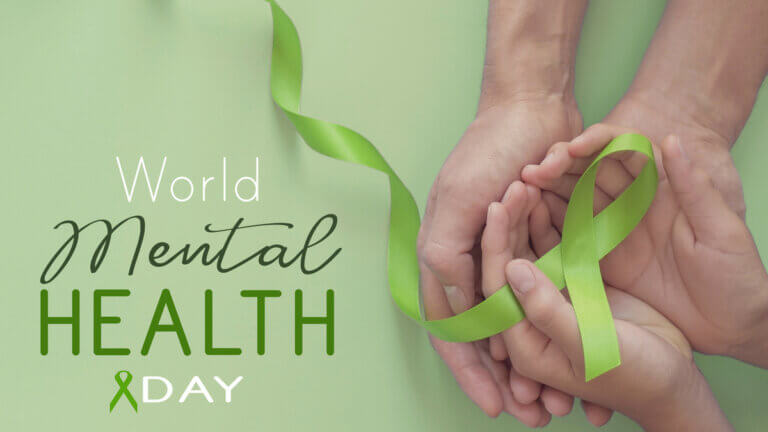World Mental Health Day: A Space for Raising Awareness

At the initiative of the World Federation for Mental Health (WFMH), World Mental Health Day has been celebrated around the world since 1992. The initiative, now promoted by local and international organizations, is emerging as a bulwark to reduce stigmas and taboos and to promote support for all people.
Year after year, the campaigns choose a theme that serves as a guide to allocate resources, design programs, and manage support tools. In 2023, the theme was “Mental health is a universal human right,” under the slogan “Our minds, our rights.” We analyzed its importance and how to promote awareness at the family and community levels.
Mental health as a basic right

According to the World Health Organization (WHO), health is defined as a “state of complete physical, mental, and social well-being and not merely the absence of disease or infirmity.” In other words, compromised mental well-being is an alteration of health in itself, hence the existence of global campaigns aimed at protecting it.
Although there have been great advances in this regard in recent years, through social networks, government campaigns, and university programs such as Master’s in Mental Health Counseling online, there’s still a long way to go. After all, as the WHO rightly points out, 1 in 8 people worldwide live with mental health problems.
It’s for this reason that mental well-being is considered a basic right. Everyone, regardless of age, sex, gender, nationality, or culture, has the right to accessible, acceptable, and quality care related to their emotional well-being. Furthermore, having a mental condition isn’t a reason to be deprived of human rights or excluded from community life.
You may be interested in: Family and Mental Health: 5 Facts You Need to Know
The importance of promoting spaces for dialogue in the family

Mental health conditions are affecting an increasing number of children and adolescents. So, too, are mothers and fathers trying to juggle parenting with their work lives. Anxiety, depression, chronic stress, and other conditions are a reality within millions of families, which is why spaces for dialogue must be promoted to counteract their consequences.
One of the objectives of the World Mental Health Day campaigns, which will run until October of next year, is to raise awareness at the local level. That is, in schools, businesses, and the community. But this can also be done at the family level with the help of the following ideas:
- Foster a positive family environment. Each member should feel that they have the confidence to share their concerns, experiences, and emotions.
- Participate together in face-to-face programs held in the community. For example, lectures, workshops, fundraising events, and so on.
- Weekly family activities. This will strengthen bonds, build trust, and allow for greater emotional connection.
- Warn about the red flags and early warning signs of mental health problems. Knowledge is power, and many times, symptoms are ignored because we don’t know that they indicate compromised mental well-being.
- Follow online mental health campaigns. Most are distributed on social media with the hashtags #WorldMentalHealthDay, #YouAreNotAlone, #MentalHealthMatters, #MentalHealthAwareness, and #EndTheStigma.
World Mental Health Day and its connection to motherhood
World Mental Health Day campaigns also target motherhood. In fact, these were the inspiration for creating World Maternal Mental Health Day, which has been celebrated on the first Wednesday in May since 2016.
It aims to raise awareness of mental health issues during and after pregnancy. For example, to make postpartum depression, fertility issues, the loss of a child, or possible health problems in newborns visible.
Don’t leave without reading: The Importance of Talking About Mental Health with Adolescents
Create community support groups
Far from promoting mental health alone, the intention is to generate community support groups. Neighbors and families can manage events, programs, and initiatives aimed at strengthening emotional well-being. After all, that’s the intention of World Mental Health Day: To encourage people to make the problem visible in order to reduce stigma and motivate help-seeking.
At the initiative of the World Federation for Mental Health (WFMH), World Mental Health Day has been celebrated around the world since 1992. The initiative, now promoted by local and international organizations, is emerging as a bulwark to reduce stigmas and taboos and to promote support for all people.
Year after year, the campaigns choose a theme that serves as a guide to allocate resources, design programs, and manage support tools. In 2023, the theme was “Mental health is a universal human right,” under the slogan “Our minds, our rights.” We analyzed its importance and how to promote awareness at the family and community levels.
Mental health as a basic right

According to the World Health Organization (WHO), health is defined as a “state of complete physical, mental, and social well-being and not merely the absence of disease or infirmity.” In other words, compromised mental well-being is an alteration of health in itself, hence the existence of global campaigns aimed at protecting it.
Although there have been great advances in this regard in recent years, through social networks, government campaigns, and university programs such as Master’s in Mental Health Counseling online, there’s still a long way to go. After all, as the WHO rightly points out, 1 in 8 people worldwide live with mental health problems.
It’s for this reason that mental well-being is considered a basic right. Everyone, regardless of age, sex, gender, nationality, or culture, has the right to accessible, acceptable, and quality care related to their emotional well-being. Furthermore, having a mental condition isn’t a reason to be deprived of human rights or excluded from community life.
You may be interested in: Family and Mental Health: 5 Facts You Need to Know
The importance of promoting spaces for dialogue in the family

Mental health conditions are affecting an increasing number of children and adolescents. So, too, are mothers and fathers trying to juggle parenting with their work lives. Anxiety, depression, chronic stress, and other conditions are a reality within millions of families, which is why spaces for dialogue must be promoted to counteract their consequences.
One of the objectives of the World Mental Health Day campaigns, which will run until October of next year, is to raise awareness at the local level. That is, in schools, businesses, and the community. But this can also be done at the family level with the help of the following ideas:
- Foster a positive family environment. Each member should feel that they have the confidence to share their concerns, experiences, and emotions.
- Participate together in face-to-face programs held in the community. For example, lectures, workshops, fundraising events, and so on.
- Weekly family activities. This will strengthen bonds, build trust, and allow for greater emotional connection.
- Warn about the red flags and early warning signs of mental health problems. Knowledge is power, and many times, symptoms are ignored because we don’t know that they indicate compromised mental well-being.
- Follow online mental health campaigns. Most are distributed on social media with the hashtags #WorldMentalHealthDay, #YouAreNotAlone, #MentalHealthMatters, #MentalHealthAwareness, and #EndTheStigma.
World Mental Health Day and its connection to motherhood
World Mental Health Day campaigns also target motherhood. In fact, these were the inspiration for creating World Maternal Mental Health Day, which has been celebrated on the first Wednesday in May since 2016.
It aims to raise awareness of mental health issues during and after pregnancy. For example, to make postpartum depression, fertility issues, the loss of a child, or possible health problems in newborns visible.
Don’t leave without reading: The Importance of Talking About Mental Health with Adolescents
Create community support groups
Far from promoting mental health alone, the intention is to generate community support groups. Neighbors and families can manage events, programs, and initiatives aimed at strengthening emotional well-being. After all, that’s the intention of World Mental Health Day: To encourage people to make the problem visible in order to reduce stigma and motivate help-seeking.
All cited sources were thoroughly reviewed by our team to ensure their quality, reliability, currency, and validity. The bibliography of this article was considered reliable and of academic or scientific accuracy.
- Mental Health Foundation. (s. f.). Mental Health Awareness Week. Consultado el 9 de febrero de 2024. https://www.mentalhealth.org.uk/our-work/public-engagement/mental-health-awareness-week
- World Health Organization. (s. f.). World Mental Health Day, 10 October 2023. Consultado el 9 de febrero de 2024. https://www.who.int/campaigns/world-mental-health-day/2023
- World Health Organization. (s. f.). World Mental Health Day. Consultado el 9 de febrero de 2024. https://www.who.int/campaigns/world-mental-health-day
- World Health Organization. (s. f.). WHO remains firmly committed to the principles set out in the preamble to the Constitution. Consultado el 9 de febrero de 2024. https://www.who.int/about/accountability/governance/constitution
- World Federation for Mental Health. (29 de marzo de 2023). Announcement - 2023 World Mental Health Day Theme. https://wfmh.global/news/2023.23-03-29_announcement
This text is provided for informational purposes only and does not replace consultation with a professional. If in doubt, consult your specialist.








